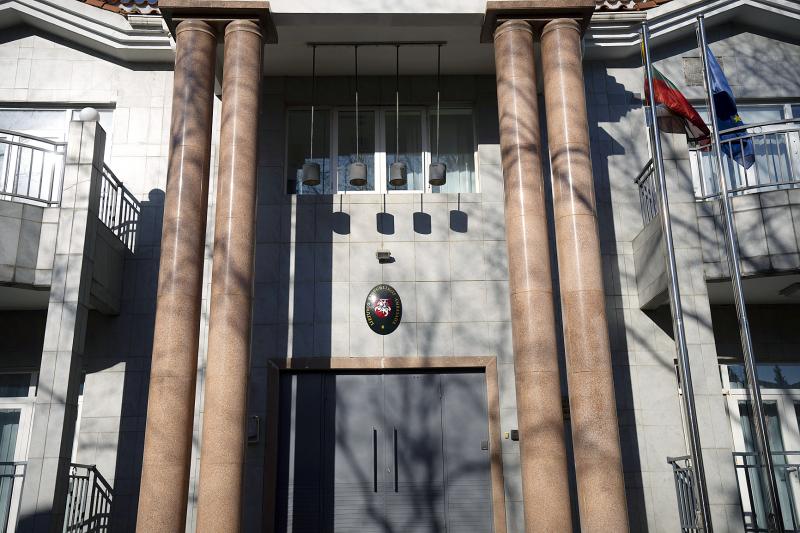The US and Germany on Wednesday backed Lithuania in its spat with China, saying the pressure exerted by Beijing against the tiny Baltic nation was unwarranted, while China yesterday countered that Washington was using Vilnius and Taipei “to contain” Beijing.
Lithuania last year let the Taiwanese office in Vilnius bear the name “Taiwanese,” instead of “Taipei,” which many countries use to avoid offending Beijing.
Lithuania’s move infuriated Beijing, which withdrew its ambassador to Vilnius and expelled the Lithuanian ambassador to Beijing.

Photo: AP
“We have immediate concern about the government of China’s attempts to bully Lithuania, a country of fewer than 3 million people,” US Secretary of State Antony Blinken said after a meeting in Washington with his German counterpart.
Blinken said that China had been pushing European and US companies to stop building products with components made in Lithuania or risk losing access to the Chinese market.
“This isn’t just about Lithuania, but about how every country in the world should be able to determine its own foreign policy free from this kind of coercion,” he said, adding that the US would work with its allies to diversify supply chains and counter “all forms of economic blackmail.”
German Minister of Foreign Affairs Annalena Baerbock said that “we as Europeans stand in solidarity at Lithuania’s side.”
US Trade Representative Katherine Tai (戴琪) told Lithuanian Minister of Foreign Affairs Gabrielius Landsbergis during a call on Wednesday that the Baltic nation had Washington’s support to counter what they called China’s “economic coercion.”
The two officials pointed out that the US and the EU “as democratic market economies, share a number of core values and principles that we need to defend internationally.”
Lithuania faces unofficial trade hurdles with China, which denies it is blocking the nation’s exports. The EU has raised the issue with the WTO.
Chinese Ministry of Foreign Affairs spokesman Wang Wenbin (汪文斌) said Washington was using the Baltic state to “use Taiwan to contain China.”
“The US side has defended Lithuania’s erroneous act of creating ‘one China, one Taiwan,’ and attempted to put together a small clique condoning the Taiwan independence forces,” Wang said at a daily briefing.
Wang also blasted Taiwan’s move to create a US$200 million investment fund for Lithuania to offset China’s economic reprisals as “dollar diplomacy,” adding that “soliciting foreign support to Taiwan independence will only lead to a dead end.”
Taiwan said it is ready to help Lithuania in resupplying trade.
“There are more than 120 sea containers — at least 1.5 million euros [US$1.69 million] worth — blocked by Beijing. We’re ready to take all of those and help Lithuanian companies,” Representative to Lithuania Eric Huang (黃鈞耀) said.
Presidential Office spokeswoman Kolas Yotaka on Wednesday announced the fund on Twitter.
“The way to confront bullying is not to give up, it’s to work together,” she wrote.
Additional reporting by Bloomberg

A magnitude 5.6 earthquake struck off the coast of Yilan County at 12:37pm today, with clear shaking felt across much of northern Taiwan. There were no immediate reports of damage. The epicenter of the quake was 16.9km east-southeast of Yilan County Hall offshore at a depth of 66.8km, Central Weather Administration (CWA) data showed. The maximum intensity registered at a 4 in Yilan County’s Nanao Township (南澳) on Taiwan’s seven-tier scale. Other parts of Yilan, as well as certain areas of Hualien County, Taipei, New Taipei City, Taoyuan, Hsinchu County, Taichung and Miaoli County, recorded intensities of 3. Residents of Yilan County and Taipei received

Taiwan has secured another breakthrough in fruit exports, with jujubes, dragon fruit and lychees approved for shipment to the EU, the Ministry of Agriculture said yesterday. The Animal and Plant Health Inspection Agency on Thursday received formal notification of the approval from the EU, the ministry said, adding that the decision was expected to expand Taiwanese fruit producers’ access to high-end European markets. Taiwan exported 126 tonnes of lychees last year, valued at US$1.48 million, with Japan accounting for 102 tonnes. Other export destinations included New Zealand, Hong Kong, the US and Australia, ministry data showed. Jujube exports totaled 103 tonnes, valued at

TRUST: The KMT said it respected the US’ timing and considerations, and hoped it would continue to honor its commitments to helping Taiwan bolster its defenses and deterrence US President Donald Trump is delaying a multibillion-dollar arms sale to Taiwan to ensure his visit to Beijing is successful, a New York Times report said. The weapons sales package has stalled in the US Department of State, the report said, citing US officials it did not identify. The White House has told agencies not to push forward ahead of Trump’s meeting with Chinese President Xi Jinping (習近平), it said. The two last month held a phone call to discuss trade and geopolitical flashpoints ahead of the summit. Xi raised the Taiwan issue and urged the US to handle arms sales to

BIG SPENDERS: Foreign investors bought the most Taiwan equities since 2005, signaling confidence that an AI boom would continue to benefit chipmakers Taiwan Semiconductor Manufacturing Co’s (TSMC, 台積電) market capitalization swelled to US$2 trillion for the first time following a 4.25 percent rally in its American depositary receipts (ADR) overnight, putting the world’s biggest contract chipmaker sixth on the list of the world’s biggest companies by market capitalization, just behind Amazon.com Inc. The site CompaniesMarketcap.com ranked TSMC ahead of Saudi Aramco and Meta Platforms Inc. The Taiwanese company’s ADRs on Tuesday surged to US$385.75 on the New York Stock Exchange, as strong demand for artificial intelligence (AI) applications led to chip supply constraints and boost revenue growth to record-breaking levels. Each TSMC ADR represents